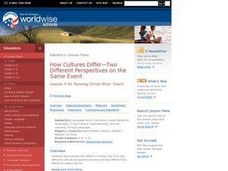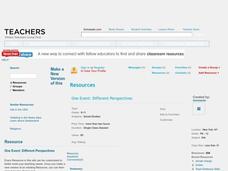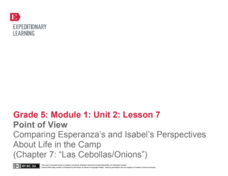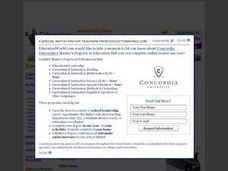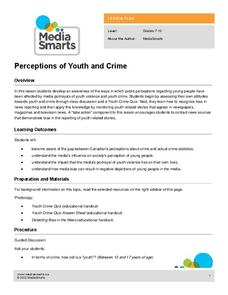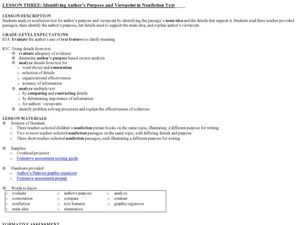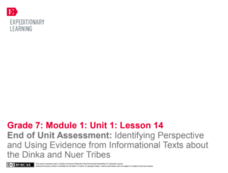Curated OER
How Cultures Differ "Two Different Perspectives on the Same Event
Students read excerpts from Peter Hessler's River Town: Two Years on the Yangtze and discuss his difficulties in learning the language, cultural clashes and how cultural perceptions shape our understanding of the world.
K12 Reader
Different Perspectives: The American Revolution
Prompt your young historians to hone in their reading comprehension skills by considering the fascinating perspective that Rudyard Kipling offers in his poem, "The American Rebellion", which provides an alternative perspective toward the...
EngageNY
Reading about the Author’s Perspective: Why Do Authors Write about Natural Disasters?
It's all about perspective. Scholars view a note from the author in Eight Days. They determine the gist and discuss what they can learn about the author's background based on the note. They then complete a fishbowl activity in which they...
Ford's Theatre
How Perspective Shapes Understanding of History
The Boston Massacre may be an iconic event in American history, but perhaps the British soldiers had another point of view. Using primary sources, including reports from Boston newspapers and secondary sources from the British...
K20 LEARN
Ichabod and Brom - Two Wild And Crazy Guys: Characters' Differing Perspectives
After reading Washington Irving's "The Legend of Sleepy Hollow," class members compare the characteristics of Ichabod Crane and Brom Van Brunt. Next, they read an article about ghosts that supposedly haunt the campus of Oklahoma...
Curated OER
Multiple Viewpoints (Three Little Pigs)
Your youngsters have probably read The Three Little Pigs, but have they read The Three Little Wolves and the Big Bad Pig? Have your learners brainstorm how the second book could be similar or different from the first. Encourage your...
University of Pennsylvania
Using Comic Strips to Teach Multiple Perspectives
Scholars view comics from two different perspectives; one paints the Alfred Dreyfus as innocent, while the other portrays the exact opposite. They solve the mystery of what happened by analyzing the source, working in groups, and...
K20 LEARN
You Think You Have Problems: Perspective in Multi-Genre Literature
Young scholars are asked to reflect on how personal experiences might influence points of view and perspectives. They read poems and biographies of the poets and then match the poem to the poet. To justify their matches, learners...
Curated OER
Multiple Perspectives
Analyze multiple perspectives in short stories. Sixth graders examine the point of view of each major character in three different short stories. After reading the stories, they role-play characters and hypothesize about the character's...
Curated OER
One Event: Different Perspectives
Watch selected scenes from the mini-series, The Path to 9/11, and then have your class download and explore the 9/11 Commission Report. How are these two sources similar and different? Have your learners summarize each source and compare...
Curated OER
Bombs Away!
Examine the different perspectives on the future of United States Navy bombing exercises taking place on Vieques, Puerto Rico with this lesson from The New York Times. Here, young learners read "Islanders to Vote on Vieques Bomb Drills,"...
Curated OER
Introduction to Canada
Ninth graders investigate the country of Canada by examining their media in this geography lesson. They use the Internet to research Canadian newspapers and analyze a topic covered by both US and Canadian media sources. After comparing...
EngageNY
Point of View: Comparing Esperanza's and Isabel's Perspectives About Life in the Camp (Chapter 7: "Las Cebollas/Onions")
Explore point of view and more with a Common Core-designed instructional activity. Learners experience different points of view by representing one of two characters from Esperanza Rising during a partner discussion. They must use...
EngageNY
Studying Conflicting Information: Varying Perspectives on the Pearl Harbor Attack, Part 2
Scholars take another look at Japan's Fourteen-Part Message. They then take turns adding ideas to sentence starters to create ideas about the different perspectives of government. To finish, groups mix and mingle to share their sentences...
Curated OER
Walk in My Shoes: A Shoe's Perspective
Help learners write a creative story from the viewpoint of a shoe. The teacher brings a variety of different types of shoes to the classroom and each person chooses one. They then write a story from the point of view of the shoe,...
K20 LEARN
The History of Spoken Word Poetry: Historical and Cultural Perspectives In Literature
Spoken word poetry, more than almost any other form, reveals the historical and cultural perspective of the poet. High schoolers listen to various spoken word poems, select one to research in-depth, and then apply what they have learned...
Media Smarts
Perceptions of Youth and Crime
Explore the potential for bias in the news and in scholars' own attitudes and opinions. Begin with a quiz on youth crime to see how learners perceive crime among their peers. After looking at the correct answers, put individuals in...
Maryland Department of Education
The Concept of Diversity in World Literature Lesson 13: Unit Culmination - Symposium
To conclude a unit on the concept of diversity in world literature, class members conduct a symposium on "African Literature in Global Perspectives." In order to earn a spot on the panel, individuals craft an original thesis that...
Curated OER
Identifying Different Perspectives - Camilo's Drums
Explore differing points of view with your upper elementary and middle schoolers. Learners watch a video segment called "Ancestors Talk through Drums" and determine what perspectives are presented. Then, using the included worksheet,...
Curated OER
From A Different Perspective
Emerging writers create a response to their reading. They read Notes from the Trail and discuss whose perspective the journal entry is written from. Then, they write a response to the journal entry in first person perspective as if they...
Curated OER
The Beginning of the War -- Two Views on Texas
Young scholars discuss the factors that can lead to war, and the motivations of countries going into war. They research two viewpoints on Texas during the Mexican War and participate in a debate with their classmates.
Curated OER
Lesson: Storyboarding Revolution
Kids consider revolution as a basis for creativity, art, and storytelling. After reading an excerpt from the book, Persepolis, learners choose one event from any world revolution to write about. They storyboard the event focusing on...
Curated OER
Identifying Author’s Purpose and Viewpoint in Nonfiction Text
Why do people write books? Pupils discover how to identify the author's viewpoint. They read non-fiction passages their instructor selects (the plan has the class look at nonfiction children's picture books), and then identify the...
EngageNY
End of Unit Assessment: Identifying Perspective and Using Evidence from Informational Texts about the Dinka and Nuer Tribes
Pupils consider the varying perspectives of people in different cultural groups as they read an informational text about the Dinka tribe of Southern Sudan and complete graphic organizers. They also respond to a constructed-response...


